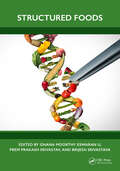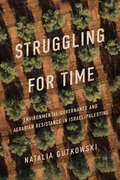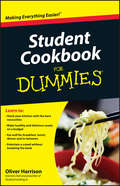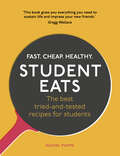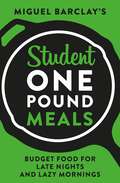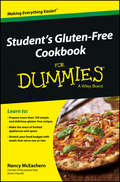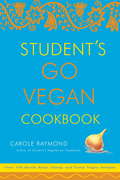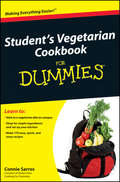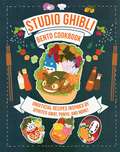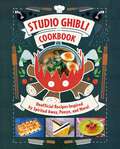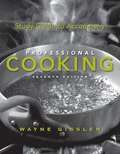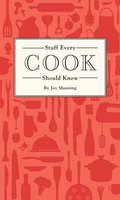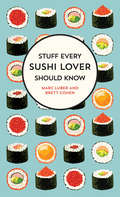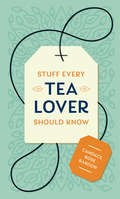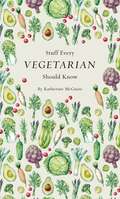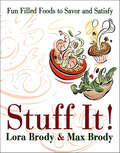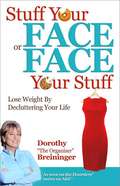- Table View
- List View
Stronger: Forty Days of Metal and Spirituality
by Brian WelchThis 40-Day devotional from Brian “Head” Welch, former lead guitarist of Korn and the New York Times bestselling author of Save Me From Myself, is an intimate tour through the Bible passages that have meant the most to him on his trying journey from substance abuse to salvation. Save Me From Myself, Welch’s self-effacing story his against addiction and his reawakening to divine love, has made the metal band icon into a hero of Christian rock. Uncompromisingly honest about his demons, and equally fervent about his faith, Head and his impassioned devotional offer a uniquely voiced guiding light perfect for young Christians and rock music fans everywhere.
Structured Foods
by Prem Prakash Srivastav Eswaran U, Gnana Moorthy Brijesh SrivastavaStructured Foods is an important reference that discusses the recent research trends on structural development in various foods. This book covers different tools and food engineering techniques such as encapsulation, 3D and 4D printing, imaging techniques, and clean meat technology. It discusses how various foods can be broken down and manipulated at the molecular level to improve their quality, safety, and healthfulness. It describes the structuring of components like starch, proteins, and polysaccharides and the stability and bioavailability of different food structures. This is a useful reference for researchers and industry experts in food technology, food engineering, and food processing.The work addresses critical food-related issues that need to be tackled, including harvesting enough food to feed the global population, improving food sustainability, reducing food waste and pollution, and improving human health. Further, it focuses on the new scientific technologies being applied by scientists for an improved food system. The book is an important resource for all stakeholders in the debate about the future of our foods in the spheres of academic, industrial, and government policy.
Struggling for Time: Environmental Governance and Agrarian Resistance in Israel/Palestine
by Natalia GutkowskiStruggling for Time examines how time is used as a mechanism of control by the Israeli state and a site of mundane resistance among Palestinian agriculture professionals. Natalia Gutkowski unpacks power structures to show how a settler society lays moral claim on indigenous time through agrarian environmental policies, science, technologies, landscapes, and bureaucracy. Shifting the analysis of Israel/Palestine from land and space to time, she offers new insight into the operation of power in agrarian environments and develops a contemporary framework to understand land and resource grabs under temporal justifications. Traveling across both policymaking arenas and Palestinian citizens' agrarian fields, Gutkowski follows the multiple ways that state officials, agronomists, planners, environmentalists, and agriculturalists use time as a tool of collective agency. Through investigations of wetland drainage in Galilee, transformations in olive agriculture, sustainable agrarian development, and regulation of the shmita biblical commandment, the "year of release" for agricultural fields, this work highlights how Palestinian citizens' agriculture has become a site for the state to settle and mediate time conflicts to justify its existence. As Struggling for Time demonstrates, time politics will take on ever greater urgency as societies and governments plan for an uncertain future in our era of climate change.
Stubborn Fat Gone!#: Discover Think Fit To Turn Off Stress And Lose 1. 5 Lbs. Every Day
by Jorge CruiseMost likely the fat that bothers you most is belly fat. Despite exercising and eating a diet low in Sugar Calories, you’re still stuck with that stubborn fat. So what’s the missing link?Breakthrough research has confirmed that combining the right diet with the right mind-set is the secret to eliminating the most stubborn of all fat – belly fat. Stress is the number one reason so many of are led to self-sabotage when trying to eat well, but following Jorge Cruise’s revolutionary Carb Control™ will curb your cravings and balance your hormones. Let Jorge guide you with daily planners full of easy, toss-together meals, and you can lose up to 11 lbs. in your first week alone!
Student Cookbook For Dummies
by Oliver HarrisonAre you a student who's fed up with making do with greasy food and monotonous ingredients? A parent who worries about your son or daughter's mounting tendency to nip to the fast-food van at all times of the day? Then look no further! Taking into account thepressures and stresses of university life - the work, the exams, the parties - this entertaining guide takes students through the essential skills, techniques and ingredients they need to make over 160 delicious, healthy meals on a budget and on the go. Packed with top tips on frugal shopping, diet maintenance and healthy-microwave cooking, as well as the low-down on hosting dinner parties, choosing wines and mixing cocktails, baked-bean-living will become a thing of the past!Student Cookbook For Dummies includes:Part 1: Getting StartedChapter 1: Saying 'Hello' To Your KitchenChapter 2: Going ShoppingChapter 3: Knowing What You're Eating Part 2: Breakfast, Lunch & SnacksChapter 4: Bigging up BreakfastChapter 5: Making great LunchesChapter 6: Snacks Part 3: Bring On The Main CourseChapter 7: Cooking For OneChapter 8: Eating the Right Food To Get You GoingChapter 9: Mastering Microwave CookingChapter 10: Making the Most of Time and MoneyChapter 11: Decadent Desserts and Treats Part 4: EntertainingChapter 12: Lads and Girls Nights' InChapter 13: Pulling Together a Sunday RoastChapter 14: Food To Impress: Cooking for a DateChapter 15: Getting into the Party SpiritPart 5: The Part Of TensChapter 16: Ten Tips For Cooking At UniChapter 17: Ten Ways to Eat On The CheapChapter 18: Ten Replacements for Expensive Ingredients
Student Eats: Fast, Cheap, Healthy – the best tried-and-tested recipes for students
by Rachel PhippsBroke, stressed and hungry? Make sure every student you know has a copy of this essential cookbook! Recently graduated, Rachel Phipps knows the reality of a student kitchen – what you want to eat versus what you can actually make and afford. Here she offers hundreds of tried-and-tested ideas to cook with the minimal utensils, no fancy gadgets and affordable ingredients, for everyone from absolute beginners to kitchen wizards. Also included: Rachel’s essential student kitchen kit, starter store cupboard shopping list, smart meal maths and simple menu plans for one, two, four or more.Chapters include: Breakfast, Lunch, Solo Dinners, Food for Friends, Something Sweet, Drinks. Recipes include: Chorizo Baked Beans, Green Eggs & Ham, Leftover Fajita Burritos, Frying-pan Lasagne, Kitchen Cupboard Fishcakes, Pizza Baked Potato, Quick Late-night Miso Soup, One-Bowl Chocolate Cake and Banana & Nutella Muffins
Student Grub: Easy Recipes For Tasty, Healthy Food
by Alastair WilliamsClear away the clutter of takeaway tins with this fresh edition of the Student Grub cookbook – the original (and best!) cookbook for university newbies. This easy-to-follow guide contains everything from basic recipes to world cuisine – from conjuring up a post-pub snack to impressing your date with a three-course culinary spectacular.
Student Grub: Easy Recipes For Tasty, Healthy Food
by Alastair WilliamsClear away the clutter of takeaway tins with this fresh edition of the Student Grub cookbook – the original (and best!) cookbook for university newbies. This easy-to-follow guide contains everything from basic recipes to world cuisine – from conjuring up a post-pub snack to impressing your date with a three-course culinary spectacular.
Student One Pound Meals: Budget Food for Late Nights and Lazy Mornings
by Miguel BarclaySTUDENT ONE POUND MEALS IS MADE UP OF A SELECTION OF SOME OF MIGUEL'S BEST RECIPES FROM HIS PREVIOUSLY PUBLISHED ONE POUND MEALS SERIES. Eat well on a tight budget and a busy schedule with Instagram chef Miguel Barclay's delicious meals that cost less than £1 per person.This collection of recipes from Miguel Barclay's previously published One Pound Meals series is designed for the student lifestyle. Arranged into chapters for various occasions - including hangover breakfasts, on-the-go library lunches, speedy suppers and movie night 'picky-bits' - this book will be any student's cooking bible for surviving away from home. 'I've always loved cooking but I'm not a fan of needlessly over-complicated recipes that waste time and money. So I've created my own style of cooking: simple ingredients, straightforward recipes and mouth-watering meals, all on a budget. Now you can eat the food you love all for under £1 per person.'Recipes include: - Ultimate £1 hangover cure- Thai omelette- Sweet potato Katsu curry- Green beans and pesto gnocchi- Vegan lentil chilli- Chicken drumstick cassoulet- Leek and mushroom pot pie- Golden syrup broccoli noodles- Spiral vegetable tart- Party pizzasAll the recipes in this book are taken from Miguel's previous One Pound Meals series.
Student's Gluten-Free Cookbook For Dummies
by Nancy MceachernThe easy, delicious, and nutritious way for students to eat gluten-freeAt least 3 million Americans are affected by celiac disease, and as awareness of this genetic disorder grows, more people are adopting the required gluten-free lifestyle. Student's Gluten-Free Cookbook For Dummies is a perfect resource, featuring cooking and nutritional advice along with dishes that are tasty and simple for young adults to prepare using low-cost and easy-to-obtain ingredients.Student's Gluten-Free Cookbook For Dummies shows you how to cook classic college meals such as pizza and pasta ... gluten-free. It tailors the information and recipes to your needs, considering time, cooking expertise, budget, and unconventional cooking methods. The book includes a brief explanation of gluten and the benefits of living without it, tips on reading labels and budgeting, and more than 160 recipes outlining the ingredients, cooking time (emphasizing any shortcuts), cost, and easy-to-follow directions. The recipes cover the categories of breakfast, lunch, dinner, dessert (including the challenge of gluten-free baking), easy-on-the-go snacks, and gluten-free entertainment food. This title includes dishes that can be assembled in about 5 minutes, microwave meals, tips for breathing new life into leftovers, and fancy meals to impress friends and family.Features a wide variety of more than 160 healthy and hearty gluten-free recipes for every meal of the dayIncludes easy on-the-go snacks, food that can be assembled in about five minutes, meals to impress, and much moreRecipes allow for a limited variety of appliances and space available to studentsThanks to Student's Gluten-Free Cookbook For Dummies, students who choose a gluten-free lifestyle, either for health reasons or simply by choice, can still enjoy delicious dishes that can be prepared quickly and easily.
Student's Go Vegan Cookbook: Over 135 Quick, Easy, Cheap, and Tasty Vegan Recipes
by Carole RaymondThe choice to follow a vegan lifestyle is simple when you’ve got a cookbook full of delicious recipes representing the very best of gourmet, ethnic, and basic cuisine—served up vegan style! Even better, these dishes are tailored to fit a student’s schedule and budget, making a vegan diet possible for just about anybody.Carole Raymond brings flavor and depth to vegan food with just a few inexpensive ingredients and recipes that are simple enough for even dorm-room cooks to wow their friends. Raymond also includes nutrition information that is vital to a healthy vegan lifestyle, as well as tips on stocking a vegan pantry, innovative substitute ingredients for all the foods you love, and suggestions on how to experiment with vegan dishes and make each mouthwatering recipe your own. Her collection of recipes includes such savory dishes as:• Apple-Pecan French Toast• Hash in a Flash• Thai Spring Rolls with Spicy Peanut Dipping Sauce• Déjà Vu Sloppy Joes• Spanish Tomato Soup• Basic Baked Tofu• Millet Salad with Curry-Ginger Dressing• Pumpkin Scones• Ten-Minute Brownies• Coconut TapiocaAnd much more!Whether you’re a curious but passionate newcomer or already a dedicated pro, the Student’s Go Vegan Cookbook has enough variety, simplicity, and strategies for you to make tempting vegan food for every meal—every day of the week!
Student's Vegetarian Cookbook For Dummies
by Connie SarrosThe easy way to eat vegetarian on campusVegetarianism is growing rapidly, and young adults?including college students?are leading the charge as more and more of them discover the many benefits to adopting a vegetarian lifestyle. However, there are limited resources for budget-conscious students to keep a vegetarian diet. Student's Vegetarian Cookbook For Dummies offers the growing population of vegetarian students with instruction and recipes for fast and fun vegetarian cooking. Personalized for students, it comes with quick-fix recipes, a variety of creative meal ideas, and money-saving tips.Plain-English explanations of cooking techniques and nutritional informationMore than 100 recipes for making vegetarian dishes that are quick, easy, and tastyBudget-conscious shopping tipsWhen dining halls are inadequate and restaurants become too expensive, Student's Vegetarian Cookbook For Dummies has you covered!
Studio Ghibli Bento Cookbook
by Barbara Rossi AzukiCreate ready-to-go, fun, and delicious meals inspired by My Neighbor Totoro, Kiki's Delivery Service, Howl's Moving Castle, Spirited Away, and more with this beautiful bento cookbook celebrating the imaginative worlds of Studio Ghibli!Make delicious bento lunches modeled after your favorite Studio Ghibli movie characters. The easy-to-follow recipes are fun to make and fun to eat! RECIPES FOR FANS: Create Calcifer, No-Face, Ponyo, and more with bentos that celebrate characters from My Neighbor Totoro, Kiki's Delivery Service, Princess Mononoke, Castle in the Sky, Howl's Moving Castle, Spirited Away, and more BEAUTIFULLY ILLUSTRATED, EASY TO FOLLOW: Original illustrations give step-by-step instructions, and inspirational movie scenes remind you of your favorite characters and moments. This cookbook gives you all you need to create ready-to-go lunches that look like the characters and scenery from Studio Ghibli's imaginative movies BENTO BASICS: Learn to cook and assemble your bentos according to state-of-the-art, easy-to-follow techniques. Recipes include gyozas, mochi, chicken tatsuta, miso-sesame green beans, fried zucchini with ponzu sauce, chicken karaage, and many more colorful, tasty, and nutritious recipes
Studio Ghibli Cookbook: Unofficial Recipes Inspired by Spirited Away, Ponyo, and More!
by Insight EditionsA Simon & Schuster eBook. Simon & Schuster has a great book for every reader.
Study Guide to Accompany Professional Cooking (7th Edition)
by Wayne Gisslen Mary Ellen GriffinThe "Study Guide to Accompany Professional Cooking, Seventh Edition" is a useful tool to help students study and review the material in the textbook "Professional Cooking. " It contains 35 chapters of key exercises related to key terms; true/false questions; completion, short-answer, and other written exercises; and math exercises. The purpose is to reinforce learning, support your study efforts, and assist you in mastering the material.
Stuff Every Beer Snob Should Know
by Ellen GoldsteinFrom the bestselling STUFF series comes this handy pocket guide to buying, tasting, and appreciating beer.From classic craft beers to trendy microbreweries, beer is booming nationwide. Whether you prefer light lagers or hearty stouts, you'll find lots to drink in in this pocket-sized guide packed with information, how-tos, and trivia for beer enthusiasts of all stripes. Seasoned craft-brew connoisseurs and newbie beer drinkers alike will learn expert tasting techniques, which glassware to use and when, how to pair beer with food, and even ways to support local breweries. Plus, guides to beer lingo, brewing industry publications, beer apps, and much more. Like all STUFF titles, the handy size and attractive package make this book perfect for a gift--just in time for Oktoberfest. Cheers!
Stuff Every Cheese Lover Should Know (Stuff You Should Know #29)
by Alexandra JonesThis pocket-sized handbook to all things cheese is the perfect gift for artisan cheese lovers, home cheesemakers, and anyone who appreciates a good wedge of cheddar.It&’s hard to think of a more universally beloved food than cheese. But there&’s so much more to learn and enjoy beyond the plastic-wrapped blocks from the grocery store. Within the pages of this pocket-sized guide, you&’ll find information, how-tos, and trivia for cheese lovers of all levels. Casual cheese eaters and connoisseurs alike will learn about• How Cheese Is Made• Why Some Cheeses Melt Differently• How to Build a Festive Cheese Board for Entertaining• Pairing Cheese with Wine and Beer• How to Make Cheese at HomePlus an illustrated guide to cheese gadgets, terms every cheese lover should know, how to host a cheese tasting, how to make the ultimate grilled cheese, and much more!
Stuff Every Coffee Lover Should Know (Stuff You Should Know #30)
by Candace Rose RardonThis pocket-sized handbook is the perfect gift for coffee connoisseurs, those looking to grind and brew their own beans, and anyone who appreciates a cup of coffee with or without caffeine. If you&’re like most people, you start every day with a hot cup of joe. But beyond your steaming morning mug, there&’s a whole world waiting to be discovered—from roast varieties to brewing methods to the traditions, ceremonies, and customs of cultures around the globe.Within the pages of this guide, coffee lovers of all levels will find useful information, helpful how-tos, and fascinating trivia about their beloved beverage, including · Highlights from Coffee History· Anatomy of the Coffee Cherry· Freshness in Coffee· Caffeine Content 101· Popular Espresso Drinks· Coffee Cocktails So get ready to read about the world&’s best coffee-growing regions, learn how to host a coffee cupping like a pro, get tips for buying ethically sourced beans, and much, much more!
Stuff Every Cook Should Know
by Joy ManningExpert cooking tips and timeless kitchen wisdom make this culinary how-to handbook a must-have for home cooks of all skill levels. You don't need expensive gadgets, cutting-edge cutlery, or a rack of exotic spices to be a great cook. You just need the timeless wisdom found in Stuff Every Cook Should Know. You'll learn * How to Care for Cast Iron * How to Sharpen a Knife * How to Reduce Waste * How to Make Meals Ahead Plus measurement conversions, kitchen organizing tips, basic knife cuts, how to stop onions from making you cry, and much more. Now you're cooking!
Stuff Every Sushi Lover Should Know (Stuff You Should Know #27)
by Brett Cohen Marc LuberA pocket guide with everything you need to know to enjoy sushi at a restaurant or at home. Sushi is one of the most popular foods in the world. But sushi lovers know there&’s more to learn beyond the spicy tuna, salmon avocado, and California maki roll lunch special at your local restaurant. This staple of the Japanese diet has been perfected by sushi chefs for hundreds of years. Each component—from the fish and the rice to the nori, vegetables, wasabi, and soy sauce—works in perfect harmony to create a single bite of pure pleasure. But sushi can also be intimidating. Where does the fish come from? Are there seasons for sushi fish? What does omakase mean? And how do you make sushi at home? Within the pages of this pocket-sized guide, you&’ll find information, how-tos, and trivia for sushi lovers at all levels. Experts and newbies alike will learn: • Types of Sushi Fish and Their Origins • The Importance of Sushi Rice • Sushi Etiquette • 10 Ways to Expand Your Palate • How to Slice Fish • And more!
Stuff Every Tea Lover Should Know (Stuff You Should Know #28)
by Candace Rose RardonTea is arguably the most popular beverage in the world, but there&’s more to know beyond the colorful boxes sold at your local grocery store. Like wine and beer, each tea variety has its own distinct history, source, and flavor profile, from Darjeeling to matcha to Silver Needle. Tea is also embedded in the traditions of many cultures around the world and is shared with others through distinctive ceremonies that include unique customs, foods, and accessories. Within the pages of this pocket-sized guide, you&’ll find information, how-tos, and trivia for tea lovers of all levels. Experts and newbies alike will learn about: • Tea Bags vs. Loose Leaf • How to Prepare Tea • Tea Families and Common Varieties • Tea Traditions around the World • How to Host an Afternoon Tea for Adults • How to Throw a Tea Party for Children • And more!
Stuff Every Vegetarian Should Know
by Katherine McguireReady to try a diet that’s greener, healthier, and better for the planet? Here’s an easy and approachable guide to the world of eating, cooking, and living meat-free. Featuring chapters on everything from choosing the right meat substitutes and building a complete protein to dining out and troubleshooting the “Help, I’m still hungry!” stage, this pocket-sized book’s tips and tutorials will take you from wannabe veggie to vegetarian extraordinaire. Plus sample shopping lists, health benefits of going meatless, and recipe ideas to keep you on track for a long—and healthy!—vegetarian life.
Stuff Every Wine Snob Should Know
by Melissa MonosoffFrom tips for tasting at home to picking the perfect bottle for a BYOB, this how-to handbook is a must-have for wine lovers everywhere.Wine may be one of the world's oldest beverages, but it's never been a better time to pour a glass. Whether you prefer robust reds or crisp, zippy whites, you'll find lots to drink in in this pocket-sized guide packed with information, how-tos, and trivia for wine enthusiasts of every variety. Seasoned sommeliers and newbie wine fans alike will learn expert tasting techniques, which glassware to use and when, how to pair wine with food, how to build a wine collection (no fancy cellar needed!) and even how to open a bottle of wine when no one brought a corkscrew. Plus, guides to wine lingo, proper serving temperatures, and the best wines for every price point. Like all STUFF titles, the handy size and attractive package make this book perfect for a gift. Sante!
Stuff It!: Fun Filled Foods To Savor And Satisfy
by Lora Brody Max BrodyStuffed foods are homey, quick, fun to make and delicious to eat. Over 75 recipes for all types of stuff ed food are offered here, including Deep Dish Stuffed Pizza, Crab Stuffed Sole, Cream Filled Cupcakes and Stuffed Blintzes with Blueberry Sauce.
Stuff Your Face or Face Your Stuff: The Organized Approach to Lose Weight by Decluttering Your Life
by Dorothy BreiningerWhile organizing the lives of her many clients, Emmy-nominated organizing expert Dorothy Breininger learned to face her own stuff, and lost seventy-five pounds in the process. In this one-of-a-kind book she addresses weight loss from the much-needed perspective of what lies underneath our clutter—metaphorically, physically, and emotionally. Whether you're a packrat or a calorie-counter, a neat freak or a binge eater, Breininger reveals why, to be successful on the scale, you must first master the clutter within you and around you. With the same no-holds barred candor that resonates with TV viewers, she offers prescient advice to help anyone face their stuff, with an organized, step-by-step approach to either toss it, tame it, or tailor it to fit their lives. Filled with personal stories from clients, her own success story, and tips from fitness coaches and organizing experts, this imminently practical book gives everyone the tools to declutter their way to their dream size.

